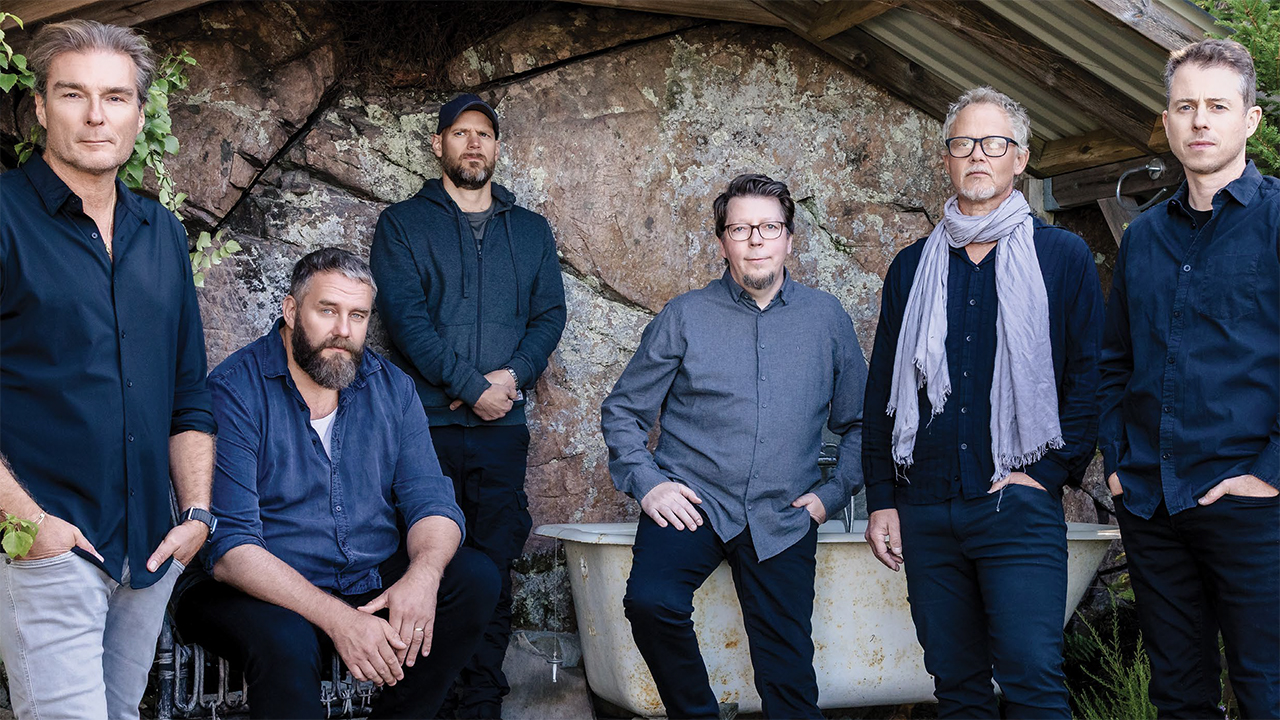"It wasn't the best of times!" Yes and The 1979 Pub Sessions
In 1979 Yes convened in Paris to begin work on their follow-up to 1978’s Tormato, with producer Roy Thomas Baker. Things did not go well...

Select the newsletters you’d like to receive. Then, add your email to sign up.
You are now subscribed
Your newsletter sign-up was successful
Want to add more newsletters?

Every Friday
Louder
Louder’s weekly newsletter is jam-packed with the team’s personal highlights from the last seven days, including features, breaking news, reviews and tons of juicy exclusives from the world of alternative music.

Every Friday
Classic Rock
The Classic Rock newsletter is an essential read for the discerning rock fan. Every week we bring you the news, reviews and the very best features and interviews from our extensive archive. Written by rock fans for rock fans.

Every Friday
Metal Hammer
For the last four decades Metal Hammer has been the world’s greatest metal magazine. Created by metalheads for metalheads, ‘Hammer takes you behind the scenes, closer to the action, and nearer to the bands that you love the most.

Every Friday
Prog
The Prog newsletter brings you the very best of Prog Magazine and our website, every Friday. We'll deliver you the very latest news from the Prog universe, informative features and archive material from Prog’s impressive vault.
Heaven & Earth, Yes’ new album, was produced by Roy Thomas Baker. But it isn’t the band’s first collaboration with the producer of Queen, Journey and The Cars: 35 years ago, Yes convened in Paris to begin work on their follow-up to 1978’s Tormato, although the sessions never saw the light of day.
Many of those tracks have subsequently appeared on various solo albums, expanded reissues of Yes albums, or the 2002 In A Word: Yes (1969-) box set. However, Heaven & Earth hasn’t seen Yes revisiting and working up any further the songs from those earlier sessions à la 2011’s Fly From Here, which was based on leftover tracks of similar vintage. Instead, their 21st studio album comprises mostly brand new material, and certainly none from those aborted sessions from 1979.
But what happened at the end of the 70s in the French capital? Why did the recordings not amount to a finished album? And why did events there lead to the departure from the band of Jon Anderson and Rick Wakeman?
Roy Thomas Baker recalls the initial excitement about the material presented by the band. “There was some great stuff,” he says.
Wakeman, however, has a very different view: of an outfit that was failing to keep up with outside musical change. “In 1979, the world of music was going through serious changes and Yes was not embracing them,” he recalls.
There are contradictory views of the city itself. “I find Paris excessively inspiring,” states Baker, although he accepts that they were too far from the centre. For Steve Howe, Paris was not conducive to a healthy, happy atmosphere, especially compared to Montreux in Switzerland where they recorded 1977’s Going For The One.
“Paris was a whole different reality – ‘reality’ being the operative word,” he says. “It wasn’t beautiful like Montreux. There was no fantasy here – this was not a place we could sit back and relax.”
Sign up below to get the latest from Prog, plus exclusive special offers, direct to your inbox!
After having to fight through traffic to get to the studio, things hardly improved. “There were definitely issues in terms of communication within the band,” says Baker.
Howe recalls Anderson playing harp instead of his usual guitar and so found it difficult to bounce ideas off him. He remembers the singer and keyboardist “had done some music together” that he and Squire “were not that clear how to treat guitaristically” – they were, he says, “very bouncy and very Rick in musical style, and a bit new; a new kind of thinking about Yes, because Jon usually wrote with Chris or me and now suddenly he was writing with Rick – which we weren’t against, but it was a different breed of music.”
Howe and Squire weren’t excited by Anderson and Wakeman’s ideas, and the feeling was evidently mutual: the guitarist vividly remembers a “farcical” situation involving Wakeman chucking peanuts at White’s drum kit, so displeased was he with the state of affairs. “This was the kind of mayhem we were creating for ourselves,” says Howe.
Wakeman agrees that it was “not the happiest of times” for Yes. “It was completely the opposite to the feelings of the band a few years earlier when we recorded Going For The One, where everybody was driving down the same musical road,” he says. “In Paris, not only were we not on the same road but we were not even heading in the same direction! Jon and I had put some songs together during the previous tour and we felt they had great potential. Sadly, this was not felt by Steve, Chris and Alan, and sessions in the studio were laborious and not pleasant at all.”
The producer acknowledges the factions within the band. “There were two camps. But trying to pull the whole thing together, I felt more like a referee than a producer.”
Did he have to bang any heads together? “No,” he laughs, “they were doing it amongst themselves! I was just doing my damnedest to keep the whole thing together.”
The situation eventually became so difficult that Atlantic Records majordomo Ahmet Ertegun flew over from New York for a crisis meeting. “His attitude,” recalls Baker, “was: ‘How the fuck do we get this back on track?’ Trying to get them in one room and get them to talk were two different things.”
By this point, Wakeman knew that things had gone too far. As he puts it: “Not even Henry Kissinger could have resolved this mess.”
Matters reached a sorry end just before Christmas when drummer Alan White broke his foot on a roller skate. Feeling dispirited, Wakeman and Anderson took solace in spirits: “Jon and I met for a drink. Well, actually, it was a whole bottle of Calvados,” he laughs. “We both agreed this wasn’t the Yes we loved and believed in.”
Wakeman is quick to clarify that statement. “By this I don’t mean the guys, as I still have great respect and love Steve, Chris and Alan very much as they have been a big part of my life. But I always refer to Yes, when I say the name, as the music. I always felt we were guardians of Yes’s music and should be treated with respect. Jon and I both felt it was slipping away and so it was time for us to slip away, too, and that’s exactly what we did.”
The final straw was that broken foot. “We had a drummer who couldn’t play. That,” says Howe, “was the catastrophic moment when we said: ‘Let’s stop.’ I think there was a feeling we all wanted to stop anyway because this session was going nowhere. It didn’t have the same bright feeling we had on Relayer or the sense of a reunion we had on Going For The One. There was no magic or chemistry between us and Roy Thomas Baker. It was just a write-off. It didn’t quite settle into anything and certainly the musical highs we had on …Topographic Oceans and Close To The Edge weren’t happening at all.
“We weren’t challenging Yes to go forward, we were finding a party line, a kind of music that was easy for us to do: sprightly and mellow and nothing like Drama,” he furthers, alluding to the punchier sound they achieved on the follow-up proper to Tormato, after finally getting the chemistry back with the arrival of Trevor Horn and Geoff Downes.
“Chris, Alan and I proved the point because when we got on to Drama, we made an album that really stung at you. It shouted, and had attitude. We didn’t have any attitude in Paris, apart from, ‘Where’s the new bottle of wine?’ or ‘Should we drive a Rolls Royce or the Bentley?’ All decisions that had fuck-all to do with music.”
Were they galvanised by punk on Drama? “There might have been a subconscious awareness of what was going on,” he concedes. Drama, he attests, “was more aggressive and heavier than some of the things we’d done.”
Following the Paris sessions, Wakeman recalls, “The studio was cancelled and everybody went their separate ways. I spent a few more days in Paris walking my German Shepherd before going home to Switzerland to contemplate a future I wasn’t expecting. Yes had already lost its guarantee of selling hundreds of thousands of records, the record company didn’t know what to do with the band and we still had more egos than the entire Premier League footballers put together.”
Not that he believes the experience was a waste of time. “Not for me,” he says. “My father always drummed into me to learn from things that haven’t always gone to plan and I did learn a lot about myself.”
For Howe, the Paris sessions haven’t quite acquired the status of legend à la The Beach Boys’ Smile, nor does he have much stomach for piecing together the finished tracks to make something approaching a complete album. But he doesn’t have any regrets.
“I’m not morbidly sad about it,” he reveals. “We had a good run and did some great things. That wasn’t one of them.”
Paul Lester is the editor of Record Collector. He began freelancing for Melody Maker in the late 80s, and was later made Features Editor. He was a member of the team that launched Uncut Magazine, where he became Deputy Editor. In 2006 he went freelance again and has written for The Guardian, The Times, the Sunday Times, the Telegraph, Classic Rock, Q and the Jewish Chronicle. He has also written books on Oasis, Blur, Pulp, Bjork, The Verve, Gang Of Four, Wire, Lady Gaga, Robbie Williams, the Spice Girls, and Pink.

